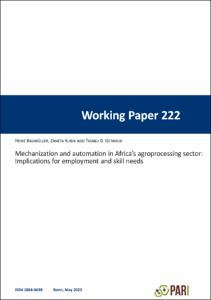Baumüller, Heike; Kubik, Zaneta; Getahun, Tigabu D.: Mechanization and automation in Africa’s agroprocessing sector : Implications for jobs and skill needs. Bonn: Center for Development Research (ZEF), 2023. In: ZEF Working Paper, 222.
Online-Ausgabe in bonndoc: https://doi.org/10.48565/bonndoc-124
Online-Ausgabe in bonndoc: https://doi.org/10.48565/bonndoc-124
@techreport{handle:20.500.11811/10883,
doi: https://doi.org/10.48565/bonndoc-124,
author = {{Heike Baumüller} and {Zaneta Kubik} and {Tigabu D. Getahun}},
title = {Mechanization and automation in Africa’s agroprocessing sector : Implications for jobs and skill needs},
publisher = {Center for Development Research (ZEF)},
year = 2023,
month = may,
series = {ZEF Working Paper},
volume = 222,
note = {A growing demand for higher-value agrifood products in Africa, driven in particular by the rapidly emerging urban middle class, will offer opportunities for the local food and beverage processing industry to generate revenue, create jobs and improve access to food on the continent. To be competitive, the industry will require efficient production methods that can generate a reliable supply of high-quality products. While the food industry in higher income countries has widely adopted power-driven machinery and automation technologies in their production, little is known about the level of mechanization and automation in African agroprocessing and even less about related impacts on employment levels. This study seeks to address this knowledge gap. To this end, a survey of 498 formal firms in the food and beverage manufacturing sector in four African countries (South Africa, Kenya, Nigeria and Ethiopia) was conducted. The findings show that all of the surveyed companies use power-driven machinery and around half also employ automation technologies. A number of factors could influence the adoption of automation, including firm size, labour costs, skills, infrastructure and access to machines and their spare parts. The results also suggest that automation is likely to change the nature of rather than replace jobs. To advance automation in the agroprocessing sector, governments should invest in tertiary education and training courses to strengthen in particular technical and soft skills, bring women into the technical professions, and develop social safety nets for lower-skilled workers who are more likely to be affected by job losses.},
url = {https://hdl.handle.net/20.500.11811/10883}
}
doi: https://doi.org/10.48565/bonndoc-124,
author = {{Heike Baumüller} and {Zaneta Kubik} and {Tigabu D. Getahun}},
title = {Mechanization and automation in Africa’s agroprocessing sector : Implications for jobs and skill needs},
publisher = {Center for Development Research (ZEF)},
year = 2023,
month = may,
series = {ZEF Working Paper},
volume = 222,
note = {A growing demand for higher-value agrifood products in Africa, driven in particular by the rapidly emerging urban middle class, will offer opportunities for the local food and beverage processing industry to generate revenue, create jobs and improve access to food on the continent. To be competitive, the industry will require efficient production methods that can generate a reliable supply of high-quality products. While the food industry in higher income countries has widely adopted power-driven machinery and automation technologies in their production, little is known about the level of mechanization and automation in African agroprocessing and even less about related impacts on employment levels. This study seeks to address this knowledge gap. To this end, a survey of 498 formal firms in the food and beverage manufacturing sector in four African countries (South Africa, Kenya, Nigeria and Ethiopia) was conducted. The findings show that all of the surveyed companies use power-driven machinery and around half also employ automation technologies. A number of factors could influence the adoption of automation, including firm size, labour costs, skills, infrastructure and access to machines and their spare parts. The results also suggest that automation is likely to change the nature of rather than replace jobs. To advance automation in the agroprocessing sector, governments should invest in tertiary education and training courses to strengthen in particular technical and soft skills, bring women into the technical professions, and develop social safety nets for lower-skilled workers who are more likely to be affected by job losses.},
url = {https://hdl.handle.net/20.500.11811/10883}
}






